公共英语三级英语语法汇总
公共英语三级语法知识汇总

公共英语三级语法知识大全一、句法分析 (1)二、词法分析 (2)三、时态 (8)四、被动语态 (11)五、情态动词 (12)六、不定式 (14)七、定语从句 (17)八、主语从句 (22)九、表语从句 (23)十、宾语从句 (23)十一、同位语从句 (24)十二、状语从句 (25)十三、虚拟语气 (41)十四、动名词 (27)十五、现在分词 (28)十六、过去分词 (31)十七、独立主格结构 (34)十八、倒装句型 (35)十九、强调句型 (36)二十、主谓一致 (37)二十一、It的用法 (39)一、句法分析1、主语:是句子要说明的人或物,可以作主语的成分有名词,主语一般在句首。
注意名词单数形式常和冠词不分家!. 1) Mr. Lee is a well-known scientist.名词作主语. 2) He reads newspapers everyday.代词作主语. 3) Two and ten is twelve.数词作主语. 4) Smoking is harmful to the health.动名词作主语. 5) To swim in that pool is a great pleasure.动词不定式作主语. 6) What we shall do next is not yet decided.从句作主语2、谓语: 说明主语的动作,状态或特征. 1) The new term begins on the 1st of September.. 2) His father is an engineer.3) She seemed happy.. 4) Li Hua showed me his album.3、宾语:指的是及物动词涉及到的人或物. 1) Wang Ling lent me a novel to read in the bus.. 2) The medicine is good for a cold.. 3) How many pieces do you want?. 4) My little sister always likes to ask questions.. 5) Would you mind coming earlier tomorrow?. 6) He asked me what I was going to do tonight4、宾语补足语:在宾语后面补充说明宾语的动作、状态、特征。
2023年大学英语三级语法知识总结汇总

三级语法考点归纳一.虚拟语气1.i.句中虚拟形式if 引导的非真实条件句(纯粹假设或发生的也许性不大):条件从句主句与现在相反did (be were) would/ should/ might/ could do与将来相反did (be were) would/ should/ might/ could do与过去相反had done would/ should/ might/ could have done例句If we left (leave) now, we should arrive in time.If they hadn’t gone on vacation, their house wouldn’t have been broken (break) into.2.原形虚拟:a.表命令、决定、规定、建议等词语之后的that-分句中,用动词原形。
suggest, demand, advise, propose, order, arrange, insist, command, require, request, desire …… that +(should) do例如He suggested that we should leave early.My suggestion is that we should tell him.b.I.i.(was.形容词/名词tha.….(should.do/例如It is absolutely essential that all the facts be examined first.3.一些句型中的虚拟形式:1.It’.(high.about.th.first.etc..tim.(that.…动词过去时.例.It’.tim.w.left..例.I.i.tim.w.wen.t.bed.2 would rather/sooner 宁愿as if/ though 仿佛would rather/sooner 谓语用过去时与现在或者将来相反as if/ though 谓语用过去完毕时与过去相反4.练习1..______.tr.i.agai.i.I_______you.A.will.a......B.should.a....C.would.wer...D.would.ha.been2.I.i.______.no.fo.th.water.th.plant._______live.A.were.woul.no..B.is.coul.no...C.were.coul...D.did.coul.not3.I.. ______.tha.chanc.t.sho.m.ability.._______th.presiden.o.thi.school.A.hav.no.had.coul.no.become ..B.ha.no.had.woul.no.hav.becom.C.di.no.have.coul.no.become ..D.doesn’.have.wil.no.become4.H.______.b.tha.burgla.i.yo.______.t.sav.him.A.migh.hav.bee.killed.hadn’.com...B.wil.b.killed.didn’.comeC.ma.b.killed.did’.com.......D.coul.b.killed.haven’.come5.I.i._______fo.you.help.._______tha.har.tim.wit.s.littl.money.A.wer.not.woul.no.spen........B.i.not.ca.no.spendC.ha.no.been.woul.no.hav.spen....D.hav.no.been.wil.no.spend6.Wher.______.yo.g.i.wa._______?A.will.break.ou............B.do.wil.brea.outC.would.wer.t.brea.ou........D.will.i.t.brea.out7.Sh.wishe.sh.______.tha.humiliatin.thing.A.doesn’.d....B.didn’.d.....C.haven’.don..D.hadn’.done8.Th.chairma.suggeste.tha.th.meetin.______.pu.off.A.ca.b.....B.b......C.i.......D.wil.be9.I.i.vita.tha.h.______.immediately.A.shoul.g...B.mus.g....C.goe......D.wen.10.I.i.tim.w._______d.ou.homework.A.begi.t....B.ca.begi.t..C.bega.t....D.wil.begi.to答案:1.选C。
最新整理公共英语三级考试经典语法讲解(5)
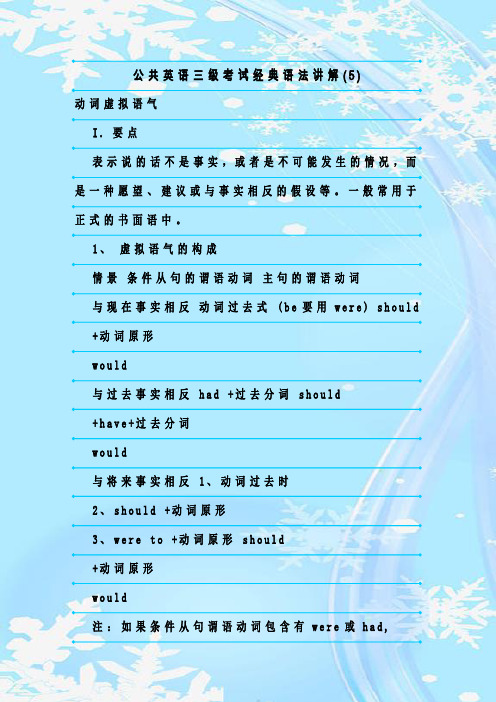
公共英语三级考试经典语法讲解(5)动词虚拟语气I.要点表示说的话不是事实,或者是不可能发生的情况,而是一种愿望、建议或与事实相反的假设等。
一般常用于正式的书面语中。
1、虚拟语气的构成情景条件从句的谓语动词主句的谓语动词与现在事实相反动词过去式 (b e要用w e r e) s h o u l d +动词原形w o u l d与过去事实相反 h a d+过去分词 s h o u l d+h a v e+过去分词w o u l d与将来事实相反 1、动词过去时2、s h o u l d+动词原形3、w e r e t o+动词原形 s h o u l d+动词原形w o u l d注:如果条件从句谓语动词包含有w e r e或h a d,s h o u l d,c o u l d有时可将i f省去,但要倒装。
如:H a d y o u(I f y o u h a d)i n v i t e d u s,w e w o u l d h a v ec o m e t o y o u r p a r t y.2、虚拟语气在各种从句的应用(1)在主语从句中用来表示惊奇、惋惜、理应如此等,其谓语形式是”s h o u l d(可省)+动词原形”,常用于以下三种句型中。
句型一:I t i s n e c e s s a r y(i m p o r t a n t,n a t u r a l,s t r a n g e,e t c)t h a t…句型二:I t i s a p i t y(a s h a m e,n o w o n d e r,e t c) t h a t…句型三:I t i s s u g g e s t e d(r e q u e s t e d,p r o p o s e d, d e s i r e d,e t c)t h a t…如: I t i s s t r a n g e t h a t h e(s h o u l d)h a v e d o n e t h a t.I t i s a p i t y t h a t h e(s h o u l d)b e s o c a r e l e s s.I t i s r e q u e s t e d t h a t w e (s h o u l d) b e s o c a r e l e s s.(2)在宾语从句中用于s u g g e s t,p r o p o s e,m o v e,i n s i s t,d e s i r e,d e m a n d,r e q u e s t,o r d e r,c o m m a n d 等动词后的宾语从句中,表间接的命令和建议。
公共英语三级考试语法要点解析
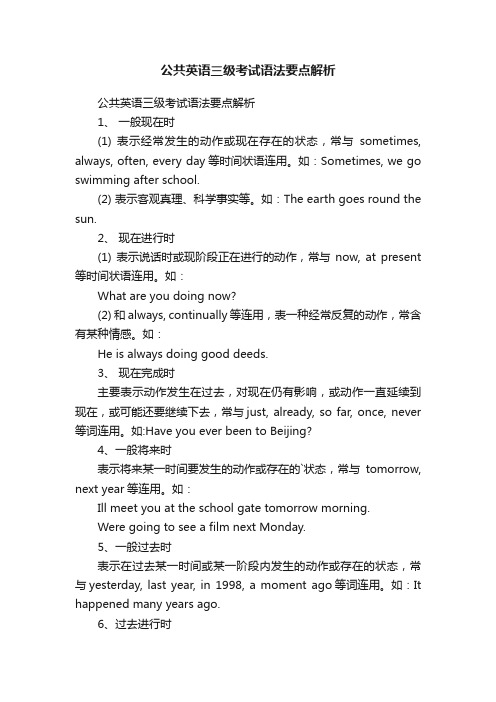
公共英语三级考试语法要点解析公共英语三级考试语法要点解析1、一般现在时(1) 表示经常发生的动作或现在存在的状态,常与sometimes, always, often, every day等时间状语连用。
如:Sometimes, we go swimming after school.(2) 表示客观真理、科学事实等。
如:The earth goes round the sun.2、现在进行时(1) 表示说话时或现阶段正在进行的动作,常与now, at present 等时间状语连用。
如:What are you doing now?(2) 和always, continually等连用,表一种经常反复的动作,常含有某种情感。
如:He is always doing good deeds.3、现在完成时主要表示动作发生在过去,对现在仍有影响,或动作一直延续到现在,或可能还要继续下去,常与just, already, so far, once, never 等词连用。
如:Have you ever been to Beijing?4、一般将来时表示将来某一时间要发生的动作或存在的`状态,常与tomorrow, next year等连用。
如:Ill meet you at the school gate tomorrow morning.Were going to see a film next Monday.5、一般过去时表示在过去某一时间或某一阶段内发生的动作或存在的状态,常与yesterday, last year, in 1998, a moment ago等词连用。
如:It happened many years ago.6、过去进行时表示过去某一时刻或某一时期正在发生的动作。
如:What were you doing this time yesterday?7、过去完成时表示在过去某一时间或动作之前已经发生或完成了的动作。
公共英语三级主要语法点

Dear同学们,以下是公共英语三级的主要九个语法点。
希望同学们有时间看看。
第一,虚拟语气。
第二,定语从句。
第三,反意疑问句。
第四,倒装句。
第五,主谓一致。
第六,强调句。
第七,连词的辨析。
第八,省略句。
第九,现在分词作状语。
第一,虚拟语气。
它主要可分为以下情况:A,表建议,要求,命令的动词,及与其相关的名词、形容词或分词,后面的从句中都要用should+动词原形作谓语,should可省略。
B,某些特殊的形容词,后面常跟虚拟语气。
这一点要尤其注意。
C,wish后表示与现实相反的愿望时要用虚拟语气。
D,would rather后若加从句则要用过去式表示虚拟语气,也可以直接加do sth宁愿做…。
E,If引导的条件状语中,表示与现在情况相反的假设,表示与过去情况相反的假设时。
虚拟语气这个考点在近两年当中出现的考分这两年稍微偏高,这一点尤其大家要格外的关注一些。
第二,定语从句。
这次考试对定语从句的考察是重点考察关系词选择和非限定性定语从句。
关系词的选择关键要从其在从句中担任着的成分决定的,而不是在主句中的。
非限定性定语从句通常由逗号与修饰的名词相隔开,而且只能由which,who,whom,whose引导,其中which既可以指物,也可以指前面一整句话,这一点大家一定要注意。
另外介词和上面的关键词连用构成符合关系词的情况也很多。
第三,反意疑问句。
可以有两点,句子本身含有否定意义的时候,比如seldom后面用肯定形式的反问。
第二,考察祈使句的反问,对陈述部分是肯定句的祈使句。
第三,I think,I believe,I suppose等表示主观看法的句子,其反意疑问句由后面的宾语从句相对应。
第四,倒装句。
倒装句一共有三项应该注意:A,only后面加状语,并放于句首时,句子用倒装;而当其修饰其它成分时不倒装。
B,表示否定意义的副词或短语,如seldom,never,rarely,in no time。
C,注意Hardly/scarcely/barely had sb done…when这一句型,表示一——就…(as soon as后不加倒装)第五,主谓一致。
公共英语三级pets3干货 英语语法汇总
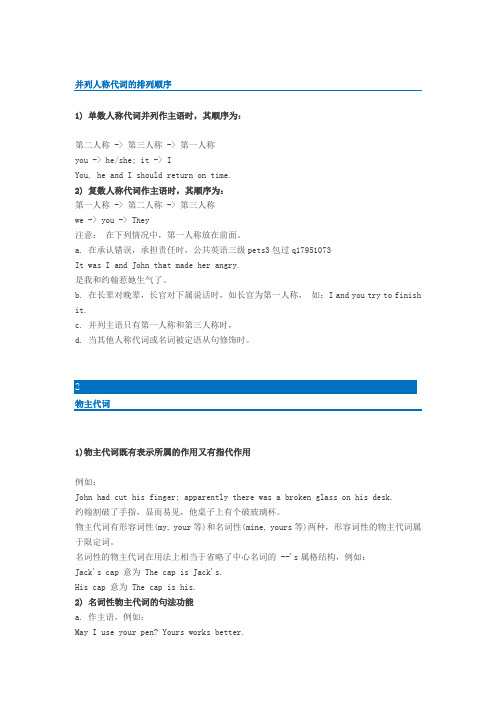
并列人称代词的排列顺序1) 单数人称代词并列作主语时,其顺序为:第二人称 -> 第三人称 -> 第一人称you -> he/she; it -> IYou, he and I should return on time.2) 复数人称代词作主语时,其顺序为:第一人称 -> 第二人称 -> 第三人称we -> you -> They注意:在下列情况中,第一人称放在前面。
a. 在承认错误,承担责任时,公共英语三级pets3包过q17951073It was I and John that made her angry.是我和约翰惹她生气了。
b. 在长辈对晚辈,长官对下属说话时,如长官为第一人称,如:I and you try to finish it.c. 并列主语只有第一人称和第三人称时,d. 当其他人称代词或名词被定语从句修饰时。
2物主代词1)物主代词既有表示所属的作用又有指代作用例如:John had cut his finger; apparently there was a broken glass on his desk.约翰割破了手指,显而易见,他桌子上有个破玻璃杯。
物主代词有形容词性(my, your等)和名词性(mine, yours等)两种,形容词性的物主代词属于限定词。
名词性的物主代词在用法上相当于省略了中心名词的 --'s属格结构,例如:Jack's cap 意为 The cap is Jack's.His cap 意为 The cap is his.2) 名词性物主代词的句法功能a. 作主语,例如:May I use your pen? Yours works better.我可以用一用你的钢笔吗? 你的比我的好用。
b. 作宾语,例如:I love my motherland as much as you love yours.我爱我的祖国就像你爱你的祖国一样深。
公共英语等级考试(PETS)3级常用句型汇总
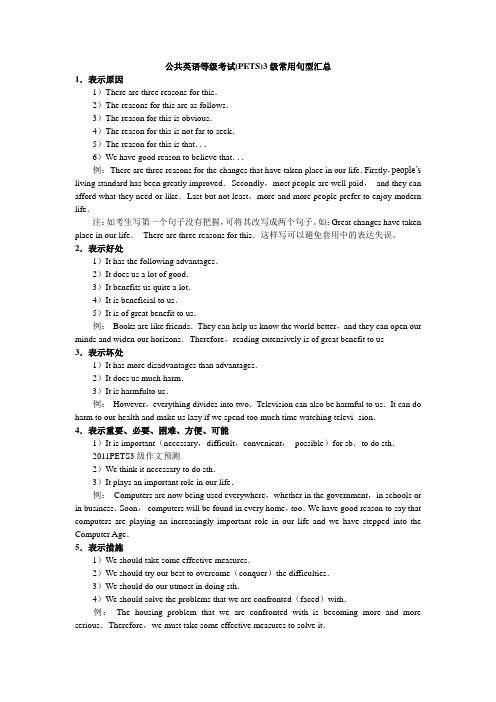
公共英语等级考试(PETS)3级常用句型汇总1.表示原因1)There are three reasons for this.2)The reasons for this are as follows.3)The reason for this is obvious.4)The reason for this is not far to seek.5)The reason for this is that...6)We have good reason to believe that...例:There are three reasons for the changes that have taken place in our life.Firstly,people’s living standard has been greatly improved.Secondly,most people are well paid,and they can afford what they need or like.Last but not least,more and more people prefer to enjoy modern life.注:如考生写第一个句子没有把握,可将其改写成两个句子。
如:Great changes have taken place in our life.There are three reasons for this.这样写可以避免套用中的表达失误。
2.表示好处1)It has the following advantages.2)It does us a lot of good.3)It benefits us quite a lot.4)It is beneficial to us.5)It is of great benefit to us.例:Books are like friends.They can help us know the world better,and they can open our minds and widen our horizons.Therefore,reading extensively is of great benefit to us3.表示坏处1)It has more disadvantages than advantages.2)It does us much harm.3)It is harmfulto us.例:However,everything divides into two.Television can also be harmful to us.It can do harm to our health and make us lazy if we spend too much time watching televi- sion.4.表示重要、必要、困难、方便、可能1)It is important(necessary,difficult,convenient,possible)for sb.to do sth.2011PETS3级作文预测2)We think it necessary to do sth.3)It plays an important role in our life.例:Computers are now being used everywhere,whether in the government,in schools or in business.Soon,computers will be found in every home,too.We have good reason to say that computers are playing an increasingly important role in our life and we have stepped into the Computer Age.5.表示措施1)We should take some effective measures.2)We should try our best to overcome(conquer)the difficulties.3)We should do our utmost in doing sth.4)We should solve the problems that we are confronted(faced)with.例:The housing problem that we are confronted with is becoming more and more serious.Therefore,we must take some effective measures to solve it.6.表示变化1)Some changes have taken place in the past five years.2)A great change will certainly be produced in the world's communications.3)The computer has brought about(导致)many changes in education.例:Some changes have taken place in people's diet in the past five years.The major reasons for these changes are not far to seek.Nowadays,more and more people are switching from grain to meat for protein,and from fruit and vegetable to milk for vitamins7.表示事实、现状1)We cannot ignore the fact that...2)No one can deny the fact that...3)There is no denying the fact that...4)This is a phenomenon that many people are interested in.5)However,that's not the case.例:We cannot ignore the fact that industrialization brings with it the problems of pollution.To solve these problems,we can start by educating the public about the hazards(危害)of pollution.The government on its part should also design stricter laws to promote a cleaner environment8.表示比较1)Compared with A,B...2)I prefer to read rather than watch TV.3)There is a striking contrast between them.例:Compared with cars,bicycles have several advantages besides being affordable.Firstly,they do not consume natural resources of petrol(石油).Secondly,they do not cause the pollution problem.Last but not least,they contribute to people's health by giving them due physical exercise.9.表示数量1)It has increased(decreased)from...to...2)The population in this city has now increased (decreased)to 800,000.3)The output of July in this factory increased by 15%compared with that of January.例:With the improvement of the living standard,the proportion(比例)of people's income spent on food has decreased while that spent on education has increased.再如:From the graph listed above,itcan be seen that student use of computers has increased from an average of less than two hours per week in 1990 to 20 hours in 2000.注:"From the graph listed above,it can be seen that"见句式12。
公共英语三级语法大总结
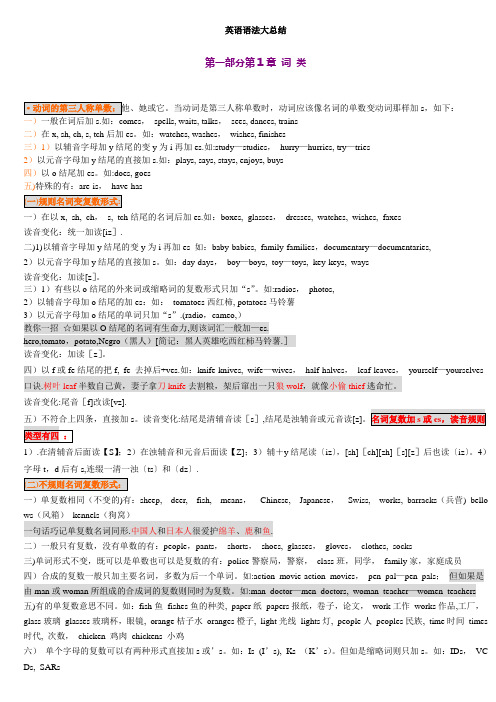
英语语法大总结第一部分第1章词类s,如下:一)一般在词后加s.如:comes,spells, waits, talks,sees, dances, trains二)在x, sh, ch, s, tch后加es。
如:watches, washes,wishes, finishes三)1)以辅音字母加y结尾的变y为i再加es.如:study—studies,hurry—hurries, try—tries2)以元音字母加y结尾的直接加s.如:plays, says, stays, enjoys, buys四)以o结尾加es。
如:does, goes五)特殊的有:are-is,have-has一)在以x, sh, ch,s, tch结尾的名词后加es.如:boxes, glasses,dresses, watches, wishes, faxes读音变化:统一加读[iz].二)1)以辅音字母加y结尾的变y为i再加es 如:baby-babies, family-families,documentary—documentaries,2)以元音字母加y结尾的直接加s。
如:day-days,boy—boys, toy—toys, key-keys, ways读音变化:加读[z]。
三)1)有些以o结尾的外来词或缩略词的复数形式只加“s”。
如:radios,photos,2)以辅音字母加o结尾的加es:如:tomatoes西红柿, potatoes马铃薯3)以元音字母加o结尾的单词只加“s”.(radio,cameo,)教你一招☆如果以O结尾的名词有生命力,则该词汇一般加—es.hero,tomato,potato,Negro(黑人)[简记:黑人英雄吃西红柿马铃薯.]读音变化:加读[z]。
四)以f或fe结尾的把f, fe 去掉后+ves.如:knife-knives, wife—wives,half-halves,leaf-leaves,yourself—yourselves 口诀.树叶leaf半数自己黄,妻子拿刀knife去割粮,架后窜出一只狼wolf,就像小偷thief逃命忙。
- 1、下载文档前请自行甄别文档内容的完整性,平台不提供额外的编辑、内容补充、找答案等附加服务。
- 2、"仅部分预览"的文档,不可在线预览部分如存在完整性等问题,可反馈申请退款(可完整预览的文档不适用该条件!)。
- 3、如文档侵犯您的权益,请联系客服反馈,我们会尽快为您处理(人工客服工作时间:9:00-18:30)。
并列人称代词的排列顺序1) 单数人称代词并列作主语时,其顺序为:第二人称 -> 第三人称 -> 第一人称you -> he/she; it -> IYou, he and I should return on time.2) 复数人称代词作主语时,其顺序为:第一人称 -> 第二人称 -> 第三人称we -> you -> They注意:在下列情况中,第一人称放在前面。
a. 在承认错误,承担责任时,It was I and John that made her angry.是我和约翰惹她生气了。
b. 在长辈对晚辈,长官对下属说话时,如长官为第一人称,如:I and you try to finish it.c. 并列主语只有第一人称和第三人称时,d. 当其他人称代词或名词被定语从句修饰时。
2物主代词1)物主代词既有表示所属的作用又有指代作用例如:公共英语三级,考前押题,高分通过QQ577132979John had cut his finger; apparently there was a broken glass on his desk.约翰割破了手指,显而易见,他桌子上有个破玻璃杯。
物主代词有形容词性(my, your等)和名词性(mine, yours等)两种,形容词性的物主代词属于限定词。
名词性的物主代词在用法上相当于省略了中心名词的 --'s属格结构,例如:Jack's cap 意为 The cap is Jack's.His cap 意为 The cap is his.2) 名词性物主代词的句法功能a. 作主语,例如:May I use your pen? Yours works better.我可以用一用你的钢笔吗? 你的比我的好用。
b. 作宾语,例如:I love my motherland as much as you love yours.我爱我的祖国就像你爱你的祖国一样深。
c. 作介词宾语,例如:Your should interpret what I said in my sense of the word, not in yours.你应当按我所用的词义公共英语三级pets3包过q17951073去解释我说的话,而不能按你自己的意义去解释。
d. 作主语补语,例如:The life I have is yours. It's yours. It's yours. 我的生命属于你,属于你,属于你。
3双重所有格物主代词不可与 a, an, this, that, these, those, some, any, several, no, each, every, such, another, which等词一起前置,修饰一个名词,而必须用双重所有格。
公式为:a, an, this, that +名词+of +名词性物主代词。
如:a friend of mine.each brother of his.4反身代词1) 列表I-myselfwe-ourselvesyou-yourselfyou-yourselvesshe-herselfhe-himselfthey-themselves2)做宾语a. 有些动词需有反身代词absent, bathe, amuse, blame, dry, cut, enjoy, hurt, introduce, behaveWe enjoyed ourselves very much last night.我们昨晚玩得很开心Please help yourself to some fish.请你随便吃点鱼b. 用于及物动词+宾语+介词take pride in, be annoyed with, help oneself to sth.I could not dress (myself) up at that time.那个时候我不能打扮我自己注:有些动词后不跟反身代词, get up, sit-down, stand up, wake up等。
Please sit down.请坐3) 作表语; 同位语be oneself: I am not myself today.我今天不舒服The thing itself is not important.事情本身并不重要4) 在不强调的情况下,but, except, for 等介词后宾语用反身代词或人称代词宾格均可如:公共英语三级,考前押题,高分通过QQ577132979No one but myself (me) is hurt.注意:a. 反身代词本身不能单独作主语。
(错) Myself drove the car.(对) I myself drove the car. 我自己开车。
b. 但在and, or, nor连接的并列主语中,第二个主语可用反身代词,特别是myself 作主语。
Charles and myself saw it.5)第二人称作宾语,要用反身代词You should be proud of yourself.你应为自己感到骄傲5相互代词1)相互代词只有each other和one another两个词组他们表示句中动词所叙述的动作或感觉在涉及的各个对象之间是相互存在的例如:It is easy to see that the people of different cultures have always copied each other. 显而易见,不同文化的人总是相互借鉴的2) 相互代词的句法功能:a. 作动词宾语;People should love one another. 人们应当彼此相爱。
b. 可作介词宾语;Does bark, cocks crow, frogs croak to each other. 吠、鸡鸣、蛙儿对唱。
说明:传统语法认为,相互关系存在于两个人或物之间用each other,存在于两个以上人和物之间用one another。
现代英语中,两组词交替使用的实例也很多,例如:He put all the books beside each other.他把所有书并列摆放起来。
He put all the books beside one another.他把所有书并列摆放起来。
Usually these small groups were independent of each other.这些小团体通常是相互独立的。
c. 相互代词可加-'s构成所有格,例如:The students borrowed each other's notes.学生们互借笔记。
6指示代词1) 指示代词分单数(this / that)和复数(these / those)两种形式,既可作限定词又可做代词例如:单数复数限定词:This girl is Mary.Those men are myteachers.代词: This is Mary. Those are myteachers.2) 指示代词的句法功能a. 作主语This is the way to do it.这事儿就该这样做b. 作宾语I like this better than that.我喜欢这个甚至那个c. 作主语补语My point is this.我的观点就是如此d. 作介词宾语I don't say no to that.我并未拒绝那个There is no fear of that.那并不可怕说明1:指示代词在作主语时可指物也可指人,但作其他句子成分时只能指物,不能指人,例如:(对)That is my teacher. 那是我的老师。
( that作主语,指人)(对)He is going to marry this girl. 他要和这个姑娘结婚。
(this作限定词)(错)He is going to marry this. (this作宾语时不能指人)(对)I bought this. 我买这个。
(this指物,可作宾语)说明2:公共英语三级,考前押题,高分通过QQ577132979That和those可作定语从句的先行词,但this和 these不能,同时,在作先行词时,只有those可指人,试比较:(对) He admired that which looked beautiful. 他赏外表漂亮的东西。
(对) He admired those who looked beautiful. 他赏那些外表漂亮的人。
(those指人) (错) He admired that who danced well. (that作宾语时不能指人)(对) He admired those who danced well. 他赏跳舞好的人。
(those指人)(对) He admired those which looked beautiful. 他赏那些外表漂亮的东西。
(those指物)7关系代词1) 关系代词用来引导定语从句。
它代表先行词,同时在从句中作一定的句子成分例如:The girl to whom I spoke is my cousin. 跟我讲话的姑娘是我表妹。
(该句中whom既代表先行词the girl,又在从句中作介词to的宾语。
)2) 关系代词有主格,宾格和属格之分,并有指人与指物之分。
在限定性定语从句中,that 可指人也可指物见表:。
